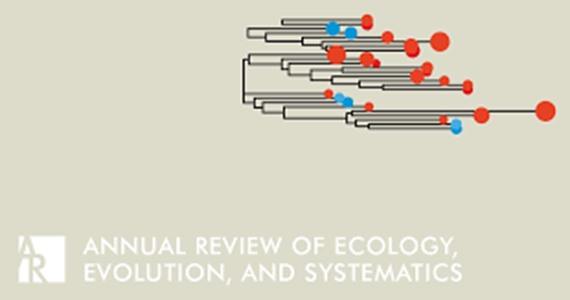Why Are Species’ Traits Weak Predictors of Range Shifts?
IF 11.2
1区 生物学
Q1 ECOLOGY
Annual Review of Ecology, Evolution, and Systematics
Pub Date : 2021-08-10
DOI:10.1146/annurev-ecolsys-012021-092849
引用次数: 29
Abstract
We examine the evidence linking species’ traits to contemporary range shifts and find they are poor predictors of range shifts that have occurred over decades to a century. We then discuss reasons for the poor performance of traits for describing interspecific variation in range shifts from two perspectives: ( a) factors associated with species’ traits that degrade range-shift signals stemming from the measures used for species’ traits, traits that are typically not analyzed, and the influence of phylogeny on range-shift potential and ( b) issues in quantifying range shifts and relating them to species’ traits due to imperfect detection of species, differences in the responses of altitudinal and latitudinal ranges, and emphasis on testing linear relationships between traits and range shifts instead of nonlinear responses. Improving trait-based approaches requires a recognition that traits within individuals interact in unexpected ways and that different combinations of traits may be functionally equivalent. Expected final online publication date for the Annual Review of Ecology, Evolution, and Systematics, Volume 52 is November 2021. Please see http://www.annualreviews.org/page/journal/pubdates for revised estimates.为什么物种特征是范围变化的弱预测因子?
我们研究了将物种特征与当代范围转移联系起来的证据,发现它们不能很好地预测几十年到一个世纪以来发生的范围转移。然后,我们从两个角度讨论了描述范围变化中种间变异的性状表现不佳的原因:(a)与物种特征相关的因素,这些因素会降低范围转移信号,这些信号源于对物种特征的测量,通常未被分析的特征,以及系统发育对范围转移潜力的影响;(b)由于物种检测不完善,在量化范围转移并将其与物种特征联系起来方面存在问题,以及海拔和纬度范围的响应差异;并且强调测试性状与距离位移之间的线性关系,而不是非线性响应。改进基于特征的方法需要认识到个体内部的特征以意想不到的方式相互作用,并且特征的不同组合可能在功能上是相同的。预计《生态、进化和分类学年度评论》第52卷的最终在线出版日期为2021年11月。修订后的估计数请参阅http://www.annualreviews.org/page/journal/pubdates。
本文章由计算机程序翻译,如有差异,请以英文原文为准。
求助全文
约1分钟内获得全文
求助全文
来源期刊
CiteScore
19.90
自引率
1.70%
发文量
21
期刊介绍:
The Annual Review of Ecology, Evolution, and Systematics is a scholarly publication that has been in circulation since 1970. It focuses on important advancements in the areas of ecology, evolutionary biology, and systematics, with relevance to all forms of life on Earth. The journal features essay reviews that encompass various topics such as phylogeny, speciation, molecular evolution, behavior, evolutionary physiology, population dynamics, ecosystem processes, and applications in invasion biology, conservation, and environmental management. Recently, the current volume of the journal transitioned from a subscription-based model to open access through the Annual Reviews' Subscribe to Open program. Consequently, all articles published in the current volume are now available under a CC BY license.

 求助内容:
求助内容: 应助结果提醒方式:
应助结果提醒方式:


